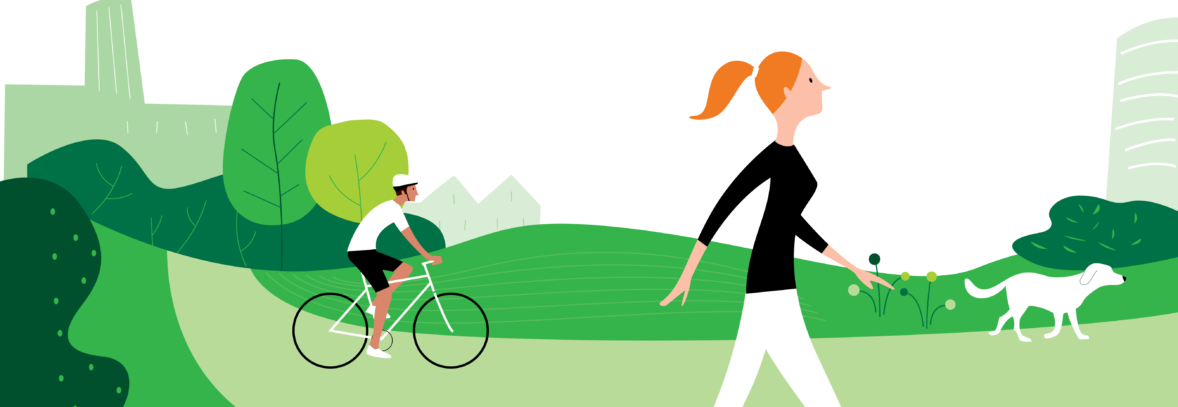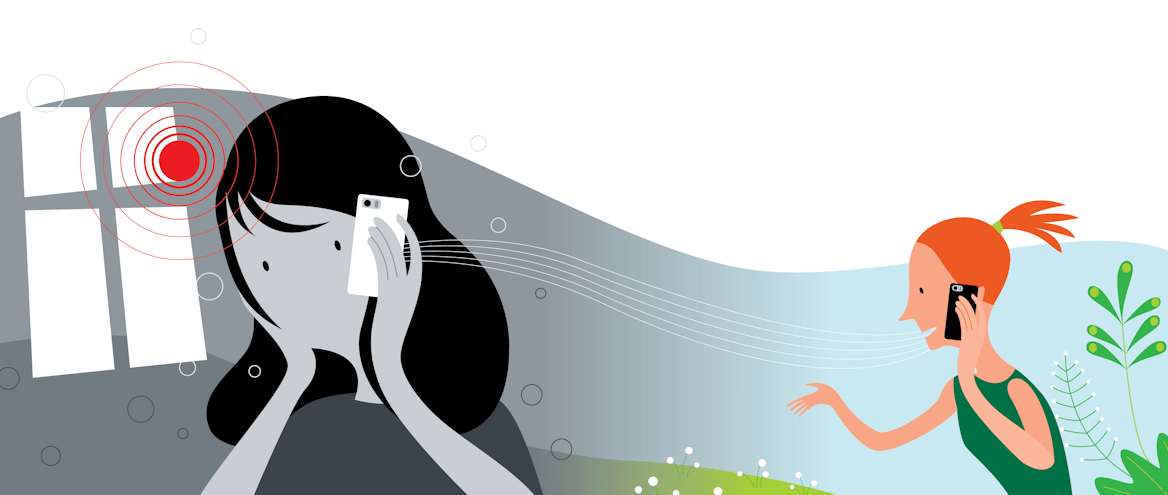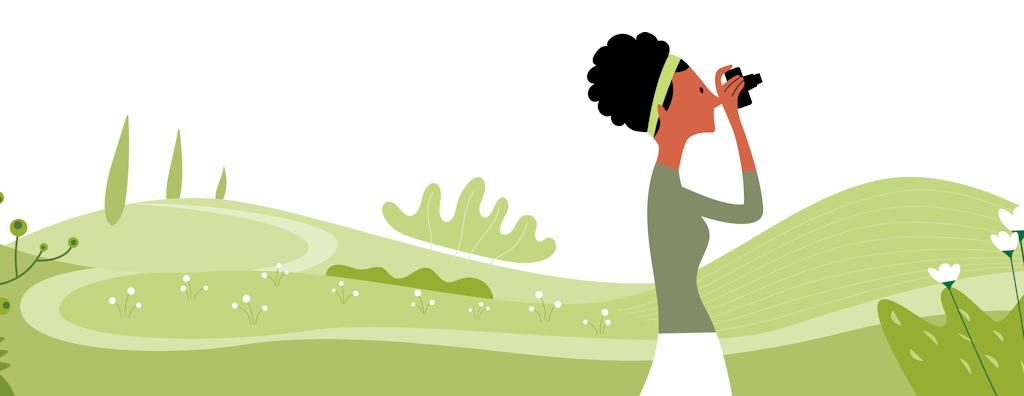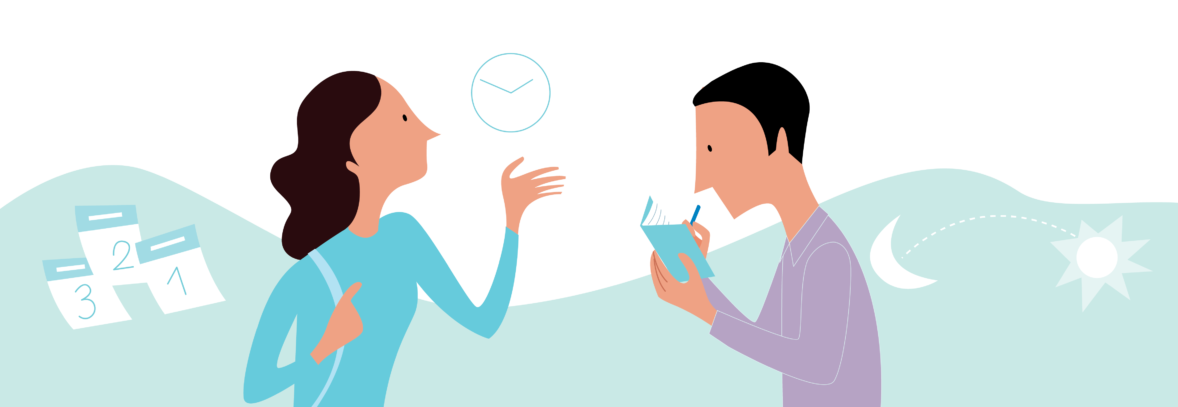TAKE CARE AND
BE KIND TO YOURSELF

Depression affects everyone differently and everyone’s experience is unique. Seeking help to manage and treat depression is important to support you in feeling better.
Managing daily tasks and finding the right balance can at times feel overwhelming.
There are many things that you can do when living with depression, to take care of yourself and help yourself recover and stay well.
Taking care of your physical wellbeing such as getting enough sleep, finding ways to exercise that you enjoy and eating healthy food can all have a positive impact on your daily life.
Prioritising your emotional wellbeing such as finding ways to manage stressful situations, building routines and seeking out social interaction and connection with others can also be helpful.
Throughout these pages, we share reflections from people who are living with depression and practical ways to help manage your daily life.
We encourage you to take care and be kind to yourself.
BEING ACTIVE
Being depressed can leave you lacking in energy, which might put you off being physically active.1,2
But, it is really important to stay physically active if you’re feeling depressed. There is a large amount of scientific evidence that demonstrates physical activity can help to lift your mood.3,4
I’ve started climbing, even though I don’t like heights, because I like to push myself and now I can do it in a safe environment with friends. I’m part of a club and meet new people or can climb on my own if I need to. I try not to be hard on myself if I fail and make sure I celebrate when I climb well.
~ Thomas*
Physical activity has been associated with improved physical health, life satisfaction, mental functioning, and psychological well-being. It can also decrease the symptoms of depression.3
Walking to the bus stop may be enough for some days. On others I walk to the one further away. It is enough, I am enough.
~ Alma*
Being depressed can make you feel tired and might put you off physical activity1,2
Physical activity can be associated with improved physical health and psychological well-being3
Physical activity can decrease the symptoms of depression3

Coping with Extremes and Extreme Behaviours
People sometimes talk about a downward spiral of events that leads to depression. Being depressed, you may stop sleeping, eating, and socialising.5 Some try to cope by using drugs or drinking too much alcohol. All of this can make you feel worse and can result in a downward spiral of depression.5
Although some triggers will be beyond your control, it is possible to avoid extremes and it is important to ask for help and support when you need it.
When feeling blue, I don’t need to harm myself in any more ways for I’m already hurting.
~ Alma*
I deserve to feel as good as possible, I deserve to be kind towards myself.
It can be helpful to recognise and look out for warning signs of extreme behaviours and when extremes of moods occur, have an action plan ready that includes external help and support.
Some people experience a downward spiral of depression5
Extremes of social behaviours and mood can be experienced by people with depression2
It can be helpful to recognise and look out for warning signs of extreme behaviour and seek appropriate help and support

Eating Healthily
Healthy eating and good nutrition are important for your physical and mental health. However, some people don’t feel like eating when they’re depressed and are at risk of becoming underweight, whilst others find comfort in food and are at risk of becoming overweight.2
Research has shown that symptoms of depression can improve when people eat a healthier diet compared with their usual one. There is no specific diet to treat depression, but experts suggest that eating a regular, well-balanced diet could help people suffering from depression.7
The hardest thing for me is healthy eating and when I’m depressed, sugar is my “go to”. So, when I’m well I remove “quick-fix sugar” items such as bars of chocolate but leave the tea and biscuits because making a cup of tea means I’m out of bed and doing something. I try to drink as much water as possible and keep microwave meals in the freezer that are quite healthy.
~ Thomas*
- Eat vegetables, fruits, and wholegrains such as wholemeal bread/pasta and brown rice7
- Cut down on processed/packaged foods7
- Eat foods containing lean protein and “healthy fats”, including oily fish7
- Drink plenty of non-alcoholic and non-caffeinated liquids (e.g. water)7
In a depression, it is so tempting and easy to eat chocolates and sweets, but I looked for more healthy “easy to eat” foods, like fruit.
~ Paul*
People with depression can be at risk of becoming overweight or underweight2
Your symptoms of depression may improve with a healthier diet6
Experts recommend regular diets include plant-based foods, such as vegetables, fruits, and wholegrains, and lean proteins, including oily fish6,7

Being in Nature
In recent years, people have been spending less and less time interacting with nature. But according to researchers, natural environments and nature might be associated with improvements in symptoms of depression.8,9
Although energy levels might be low and I might be disinterested in my surroundings, I have found that even a short walk in a park helped.
~ Helen*
Scientists have suggested that natural environments can lead to feelings of happiness and pleasure.9 What’s more, there can be a positive relationship between time spent in nature and a reduced risk of depression.8,9
Nature can be different for different people and might include different places and spaces. Nature is often considered as something that exists far away from cities. But in reality, there is nature all around us, and flowers and plants can bring nature closer to you within your home.
Even in the city you can find places that allow you to connect with nature, for instance, all the gardens and parks in/or around the center of the city.
~ Maria*
Taking the time to be mindful of, experience, and appreciate natural environments is important.8,9
I take in all the sights, sounds and smells of nature at the beach whilst surfing. I breathe and I think about my breathing and although it’s not always easy, it’s always worth it.
~ Thomas*
There can be a positive relationship between time spent in nature and reduced risk of depression8,9
Natural environments and nature can lead to happiness and pleasure9
Nature can be defined differently by each person, and can include different places.

Building a Routine
Because depression can stop you feeling in control, you may find that setting up a regular routine can help. The science behind this is that when we organise ourselves and know what to expect, we have more personal resources that can be used to look after our mental and emotional health. This is not surprising because routines protect and help people feel safer because they know what to expect.10
Even though it was hard to get the energy or interest sometimes, it helped me to have a routine and put a plan in place on the good days.
~ Helen*
Not having a routine can negatively affect your stress levels, sleeping, and eating.11
I’ve always felt frustrated with my messy house. But I began to think like this: “I surely can clean for 5 minutes a day, and slowly work towards longer periods.” Soon I started feeling excited about improving my living space!
~ Maria*
Scientists believe that having a routine can promote health and wellness through structure and organisation.11 Having a routine can help reduce stress and have a positive impact on mood.10,11 Not only can it improve your mental health, a routine can also improve your overall health and well-being.11
When my depression was at its worst, nothing gave me any pleasure, even things that had mattered earlier. So, I had to force myself to eat, to exercise, to sleep, and so on. Then I made a schedule of things that were good for me and as it became a routine it was a bit easier. After a while I started to enjoy things again.
~ Lauri*
Having a routine can help you feel safer because you know what to expect10
Having a routine can reduce stress and can have a positive impact on your mood11
Having a routine can promote health and wellness11

SLEEPING
Insomnia and sleep disruption are common symptoms of depression and around 90% of people with depression experience sleep problems.2,12
I found that being in a warm, comfortable place and having a regular routine helped when I had sleep problems.
~ Helen*
Scientists and doctors know that sleep disruption and insomnia are risk factors for depression.13 And, when people feel depressed they can get into poor sleeping patterns; difficulty falling asleep, waking up during the night and being unable to return to sleep or, conversely, they might experience prolonged sleep episodes at night or increased daytime sleep.2
When my sleep routine was disturbed, I forced myself to drink a herbal tea in order to move into a sleepy mood.
~ Paul*
Think about how much sleep you get on a daily basis. Most people need 7 to 9 hours of sleep per night.14 If you experience sleep problems, it is important that you discuss these with your doctor who can offer help and advice on how to overcome them.
When thoughts are keeping me awake during the night I know I have too much stress on me. I need to cut something out.
~ Alma*
Sleep issues are common in depression2,12
Sleep disturbance is both a symptom of, and also a risk factor for depression2,13
Most people need 7 to 9 hours of sleep every night14

MANAGING STRESS
When I was depressed I was also tired all the time. Even little disappointments were emotionally hard and stressful. I had to learn again to manage stressful things. I had to repeat it to myself that this isn´t such a big deal.
~ Lauri*
Scientists recognise that stress is a normal reaction that occurs in response to threats or difficulties. This is sometimes called the “fight or flight response” and is a natural reaction to danger.15
Scientists and doctors understand that stress causes physical changes which are designed to help you take on threats or difficulties.
You may notice that your heart pounds, your breathing quickens, your muscles tense, and you start to sweat.15 Once the threat or difficulty is over, the physical effects usually fade. But, stress can lead to over-activity of the body’s stress response mechanisms. It can impact your emotional, mental, and even physical health.15
When internal stress overwhelms me, I decide to take a warm bath whilst listening to relaxing music.
~ Paul*
Relaxing in the way you like can help you manage stress.
I take time also for being by myself and relaxing the way I like. That is equally as important as getting things done.
~ Alma*
Stress is a normal reaction15
Stress can impact your emotional and mental health15
Relaxing in the way you like can help you managing stress

Seeking Human Contact and Social Interaction
People with depression frequently withdraw from social interactions, but research suggests that the risk of depression could be doubled in people with low levels of human contact.2,16 The likelihood of having depression and the severity of symptoms may increase as the frequency of human contact and social interaction decreases.16
When you’re depressed you might feel like you want to be alone.2,17 It’s sometimes good to have personal space and some alone time, but experts tell us that isolating yourself can make you feel more depressed, whereas social interaction can have a positive influence on your symptoms.16,17
Even if you don’t feel like talking, being with other people, family and friends, is still connecting with the outside world.
~ Helen*
Although it might be difficult, maintaining social interactions can be an effective way of dealing with depression. The benefits of staying socially active and maintaining relationships with friends and family who know and understand you can have a positive effect.17 However, make sure that you are comfortable with the amount of social interactions undertaken.
At first it was very hard to meet people after my depression. But then I realized that I don´t have to be funny, happy or positive all the time when meeting people. I found new people who understood what I was going through at that moment in time and I also started to enjoy my time alone.
~ Lauri*
People with depression frequently withdraw from human contact and social interactions2,16,17
Isolation can make you feel more depressed16,17
Social interactions can have a positive effect on your symptoms16,17


Resources
Information and support can help you manage your symptoms and experience of depression. Follow these links to useful websites and resources:
BEYOND BLUE
Provides large number of resources and information for depression, anxiety, and bipolar disorder
www.beyondblue.org.au
BLACK DOG INSTITUTE
Provides a range of information on depression and bipolar disorder
www.blackdoginstitute.org.au
SANE AUSTRALIA
Promotes the understanding of mental illness through a range of publications and services. It is not a crisis counselling service
www.sane.org.au
LIFELINE
A telephone crisis support service, operating 24 hours a day. Phone 131114
www.lifeline.org.au
Questions to Ask Your Doctor: Finding the right treatment for your depression starts with asking your doctor the right questions. Download the discussion guide by clicking here.
References:
- NHS. Clinical depression. Available from: www.nhs.uk/conditions/clinical-depression. Accessed on: December 9, 2019.
- American Psychiatric Association. Diagnostic and Statistical Manual of Mental Disorders DSM-5. 5 ed. Washington, DC: American Psychiatric Press 2013.
- Mikkelsen K et al. Exercise and mental health. Maturitas. 2017; 106: 48-56.
- Carek PJ, et al. Exercise for the treatment of depression and anxiety. Int J Psychiatry Med. 2011; 41(1): 15-28.
- NHS. Causes. Clinical depression. Available from: www.nhs.uk/conditions/clinical-depression/causes. Accessed on: December 9, 2019.
- Jacka FN, et al. A randomised controlled trial of dietary improvement for adults with major depression (the ‘SMILES’ trial). BMC Med. 2017; 15(1): 23.
- Beyond Blue. Eating Well. Available from: www.beyondblue.org.au/get-support/staying-well/eating-well. Accessed on: May 6, 2022.
- van den Bosch M, et al. Environmental exposures and depression: Biological mechanisms and epidemiological evidence. Annu Rev Public Health. 2019; 40: 239-259.
- Pearson DG, et al. The great outdoors? Exploring the mental health benefits of natural environments. Front Psychol. 2014; 5: 1178.
- Heintzelman SJ, et al. Routines and meaning in life. Pers Soc Psychol Bull. 2019; 45(5): 688-699.
- Northwestern Medicine. Health benefits of having a routine. Available from: www.nm.org/healthbeat/healthy-tips/health-benefits-of-having-a-routine. Accessed on: December 9, 2019.
- Tsuno N, et al. Sleep and depression. J Clin Psychiatry. 2005; 66(10): 1254-1269.
- Franzen PL, et al. Sleep disturbances and depression: Risk relationships for subsequent depression and therapeutic implications. Dialogues Clin Neurosci. 2008; 10(4): 473-481.
- Hirshkowitz M, et al. National Sleep Foundation’s updated sleep duration recommendations: Final report. Sleep Health. 2015; 1(4): 233-243.
- NHS. Stress. Available from: www.nhs.uk/conditions/stress-anxiety-depression/understanding-stress. Accessed on: December 9, 2019.
- Teo AR, et al. Social relationships and depression: ten-year follow-up from a nationally representative study. PLoS One. 2013; 8(4): e62396.
- Steger MF, at al Depression and everyday social activity, belonging, and well-being. J Couns Psychol. 2009; 56(2): 289–300.
*Quotes and insights reflect the experiences of real patients living with depression.
For more information or to report an adverse event contact Servier Medical Information on 1800 153 590.